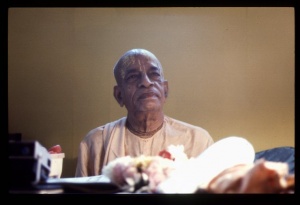CC Antya 3.150: Difference between revisions
m (1 revision(s)) |
(Vanibot #0054 edit - transform synonyms into clickable links, which search similar occurrences) |
||
| (One intermediate revision by one other user not shown) | |||
| Line 1: | Line 1: | ||
{{ | [[Category:Sri Caitanya-caritamrta - Antya-lila Chapter 03]] | ||
<div style="float:left">'''[[Sri Caitanya-caritamrta|Śrī Caitanya-caritāmṛta]] - [[CC Antya|Antya-līlā]] - [[CC Antya 3|Chapter 3: The Glories of Śrīla Haridāsa Ṭhākura]]'''</div> | |||
<div style="float:right">[[File:Go-previous.png|link=CC Antya 3.149|Antya-līlā 3.149]] '''[[CC Antya 3.149|Antya-līlā 3.149]] - [[CC Antya 3.151|Antya-līlā 3.151]]''' [[File:Go-next.png|link=CC Antya 3.151|Antya-līlā 3.151]]</div> | |||
{{CompareVersions|CC|Antya 3.150|CC 1975|CC 1996}} | |||
{{RandomImage}} | |||
==== TEXT 150 ==== | ==== TEXT 150 ==== | ||
<div class="verse"> | |||
<div | :sarvajña nityānanda āilā tāra ghare | ||
sarvajña nityānanda āilā tāra ghare | :āsiyā vasilā durgā-maṇḍapa-upare | ||
āsiyā vasilā durgā-maṇḍapa-upare | |||
</div> | </div> | ||
| Line 13: | Line 16: | ||
==== SYNONYMS ==== | ==== SYNONYMS ==== | ||
<div class="synonyms"> | |||
<div | ''[//vanipedia.org/wiki/Special:VaniSearch?s=sarva&tab=syno_o&ds=1 sarva]-[//vanipedia.org/wiki/Special:VaniSearch?s=jña&tab=syno_o&ds=1 jña]'' — omniscient; ''[//vanipedia.org/wiki/Special:VaniSearch?s=nityānanda&tab=syno_o&ds=1 nityānanda]'' — Lord Nityānanda; ''[//vanipedia.org/wiki/Special:VaniSearch?s=āilā&tab=syno_o&ds=1 āilā]'' — came; ''[//vanipedia.org/wiki/Special:VaniSearch?s=tāra&tab=syno_o&ds=1 tāra] [//vanipedia.org/wiki/Special:VaniSearch?s=ghare&tab=syno_o&ds=1 ghare]'' — at his house; ''[//vanipedia.org/wiki/Special:VaniSearch?s=āsiyā&tab=syno_o&ds=1 āsiyā]'' — coming; ''[//vanipedia.org/wiki/Special:VaniSearch?s=vasilā&tab=syno_o&ds=1 vasilā]'' — sat down; ''[//vanipedia.org/wiki/Special:VaniSearch?s=durgā&tab=syno_o&ds=1 durgā]-[//vanipedia.org/wiki/Special:VaniSearch?s=maṇḍapa&tab=syno_o&ds=1 maṇḍapa]-[//vanipedia.org/wiki/Special:VaniSearch?s=upare&tab=syno_o&ds=1 upare]'' — on the altar of the ''Durgā-maṇḍapa''. | ||
sarva- | |||
</div> | </div> | ||
| Line 21: | Line 23: | ||
==== TRANSLATION ==== | ==== TRANSLATION ==== | ||
<div class="translation"> | |||
<div | |||
Lord Nityānanda, who is omniscient because He is the Supreme Personality of Godhead, came to the house of Rāmacandra Khān and sat down on the altar of the Durgā-maṇḍapa. | Lord Nityānanda, who is omniscient because He is the Supreme Personality of Godhead, came to the house of Rāmacandra Khān and sat down on the altar of the Durgā-maṇḍapa. | ||
</div> | </div> | ||
| Line 28: | Line 29: | ||
==== PURPORT ==== | ==== PURPORT ==== | ||
<div class="purport"> | |||
Well-to-do Hindu gentlemen constructed their houses with a place called the ''Durgā-maṇḍapa'' for the worship of the goddess Durgā. There they generally held worship of the goddess every year in the month of ''Āśvina'' (September-October). Rāmacandra Khān possessed such a ''Durgā-maṇḍapa'' at his residence. | |||
</div> | |||
<div | <div style="float:right; clear:both;">[[File:Go-previous.png|link=CC Antya 3.149|Antya-līlā 3.149]] '''[[CC Antya 3.149|Antya-līlā 3.149]] - [[CC Antya 3.151|Antya-līlā 3.151]]''' [[File:Go-next.png|link=CC Antya 3.151|Antya-līlā 3.151]]</div> | ||
__NOTOC__ | |||
</div> | __NOEDITSECTION__ | ||
__NOTOC__ | |||
Latest revision as of 20:23, 19 February 2024

His Divine Grace
A.C. Bhaktivedanta Swami Prabhupada
A.C. Bhaktivedanta Swami Prabhupada
TEXT 150
- sarvajña nityānanda āilā tāra ghare
- āsiyā vasilā durgā-maṇḍapa-upare
SYNONYMS
sarva-jña — omniscient; nityānanda — Lord Nityānanda; āilā — came; tāra ghare — at his house; āsiyā — coming; vasilā — sat down; durgā-maṇḍapa-upare — on the altar of the Durgā-maṇḍapa.
TRANSLATION
Lord Nityānanda, who is omniscient because He is the Supreme Personality of Godhead, came to the house of Rāmacandra Khān and sat down on the altar of the Durgā-maṇḍapa.
PURPORT
Well-to-do Hindu gentlemen constructed their houses with a place called the Durgā-maṇḍapa for the worship of the goddess Durgā. There they generally held worship of the goddess every year in the month of Āśvina (September-October). Rāmacandra Khān possessed such a Durgā-maṇḍapa at his residence.